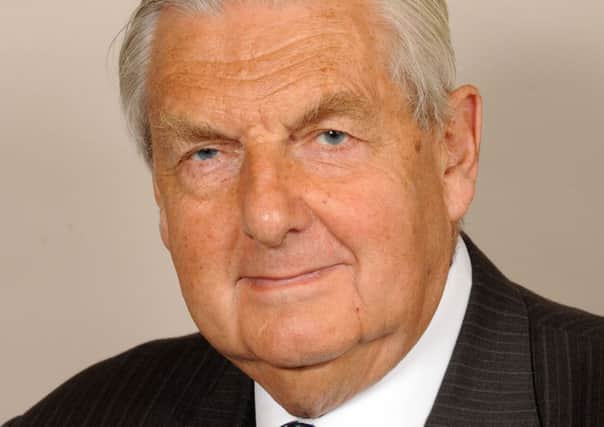Obituary: Lord Mayhew


Patrick Mayhew was an establishment figure: imposing in stature and commanding real authority: as a barrister, in the House of Commons and as a minister in Northern Ireland.
As Solicitor General he played a major role in the Westland crisis when Margaret Thatcher saw the resignation of two of her senior ministers - Leon Brittan and Michael Heseltine. Under John Major Mayhew was a patient and shrewd negotiator in trying to solve the Irish Question: many historians consider his time there provided the basis for Tony Blair’s Good Friday Agreement in 1998. Mayhew maintained channels of communication with the IRA and in 1995 he was the first Minister to meet Gerry Adams, the Sinn Fein leader.
Advertisement
Hide AdAdvertisement
Hide AdMayhew was keen to solve the Irish problem and established good relations with the Taoiseach, Albert Reynolds, and built up trust within the various loyalist factions. Despite the social turmoil and the atrocities Mayhew persisted in trying to build bridges.
Mayhew was a straight-talking and no nonsense man -articulate with a quick brain. At times he was at odds with some of his Cabinet colleagues. They were not best pleased when it was announced Mayhew was the first secretary of state to address an Orange Lodge and had supported secret contacts with Sinn Fein. But Mayhew was resolute: in 1994 the IRA called a hoped-for permanent cease fire. Mayhew categorically insisted all their weapons be handed in.
Mayhew was a substantial figure in the Tory party but got sucked into some of the less agreeable aspects of day-to-day politics. Somehow he remained aloof and was, arguably, one of the last real grandees of the party.
Patrick Barnabas Burke Mayhew (widely known as Paddy) was the son of an oil executive and attended Tonbridge and read Law at Balliol College, Oxford. He was president of the Union and of the university Conservative Association. He was called to the Bar at Middle Temple in 1955 and took Silk in 1972 specialising in criminal law.
In 1974 he was elected for Tunbridge and within two years was a member of the 1922 Committee. In 1979 Mrs Thatcher sent him as a junior minister to the Department of Employment where his legal training proved invaluable in drafting the trade union reform legislation. It also led to some confrontations with the PM as she wanted much stronger laws.
In 1983 she appointed him Solicitor General and while Mayhew supported various liberal issues (ending imprisonment for vagrancy) he strongly opposed proposals to incorporate the European Convention on Human Rights into British law.
But his time as a senior officer was beset by high profile cases such as Sara Tisdall who leaked stories to The Guardian and Clive Ponting who leaked information about the sinking of the Belgrano. Then there was the on-going saga regarding the publication of Peter Wright’s Spyctacher diaries.
But the scandal in which Mayhew became embroiled was the Westland Affair in 1986. The trade and industry department leaked a letter in which Mayhew accused Heseltine, the defence secretary, of “material inaccuracies” regarding the sale of the Somerset helicopter company to a European consortium. Leon Brittan, the trade secretary resigned and Heseltine famously stormed out of the cabinet in high dudgeon. He resigned, though it was widely suspected that Thatcher herself had authorised the leak.
Advertisement
Hide AdAdvertisement
Hide AdSir Tam Dalyell, the former MP for Linlithgow, was much involved in the debate in the House. He told The Scotsman yesterday, “Patrick Mayhew was furious that his law officers’ letter had been leaked with the knowledge of Number 10. Patrick was a thoroughly honourable man.”
In 1991 the new Prime Minister, John Major, appointed Mayhew Northern Ireland Secretary: it was a post he had long wanted - “I have a great love for the Irish people which doesn’t stop in either direction at the border” he stated before going to Stormont. In fact, Mayhew had spent much of his youth with relations near Cork.
His time in Northern Ireland was fraught with problems: the Troubles were at their height and the IRA campaign remained bloody and unbounded. There were savage bombings in the City of London, Manchester and Warrington.
Mayhew maintained a positive dialogue with the Dublin government. ‘Talks about talks’ were begun and Mayhew said, “There is a huge prize for Ireland if hatreds and suspicions can be mitigated and togetherness can be engendered slowly.”
Mayhew was a lover of cricket and the countryside of Kent. He was a man of much charm, courtesy and wit. John Major once ruminated, “If I’d had 20 Paddy Mayhews in my cabinet, I would have been fine.”
Mayhew married Jean Gurney (a member of the Barclays Bank family). She and their four sons survive him.
ALASDAIR STEVEN